Читать книгу Haney's Art of Training Animals - W. H. Burroughs - Страница 24
На сайте Литреса книга снята с продажи.
TALKING HORSES.
ОглавлениеTable of Contents
If neatly managed one of the most “taking” performances of the “arena” is the answering of questions by the horse. Yankee Robinson has a very fine animal, who replies to his master’s interrogations with much seeming judiciousness. Horses may be taught to shake and nod their heads as negative or affirmative replies, in either of two ways. The first method of training is this: Take your position at the horse’s head with a pin in your hand. Gently prick the animal’s breast. The horse bobs his head, just as he would had a fly alighted on the spot. Repeat the operation several times, each time caressing him, and perhaps rewarding him with a bit of apple occasionally. He will soon learn to nod his head on merely having the hand pointed toward his breast, or he may be trained to do the same by a motion of the foot. To teach the horse to shake his head it is only necessary to prick him slightly anywhere along the mane or over the withers. After a little teaching he will do so on your raising your hand to your head, a motion whose connection with the horse’s action will scarcely be suspected by the audience.
The second method is by pricking his breast at the same moment that you say “yes,” or any other particular word; and by pricking his withers at the same time you say the word “no.” He will soon learn to make the desired motion on hearing the word, even though no motion whatever is made. When exhibiting, the questions should be asked first, and immediately after the signal given to the horse. He, of course, knows nothing of the question, but obeys a definite command, just as he would if ordered to “back” or “whoa.”
Madame Tournaire, who performed her horse by the first method, had a way of coquettishly toying with her whip, and would give the horse the requisite signals by what the public imagined to be a mere display of feminine grace.
Where the horse obeys a word, that word must be incorporated into the question asked, in such a way as to attract his attention. If used too near the commencement of the sentence he will reply before the question is out of your mouth. It is not necessary to use the exact word that he “works” by, provided it sounds to him like it; thus, Yankee Robinson says to his horse during the performance, “I guess you’re as handsome a fellow as these ladies and gentlemen ever saw—don’t you guess so?” The horse nods his head at the emphasized word “guess,” supposing it to be his command “yes.” The next question, perhaps, is, “But others know the most?” In this case the horse, not being posted on Webster, and being guided by the sound, gives his head a negative shake, considering “no” and “know” synonymous.
PERFORMING PONIES.
